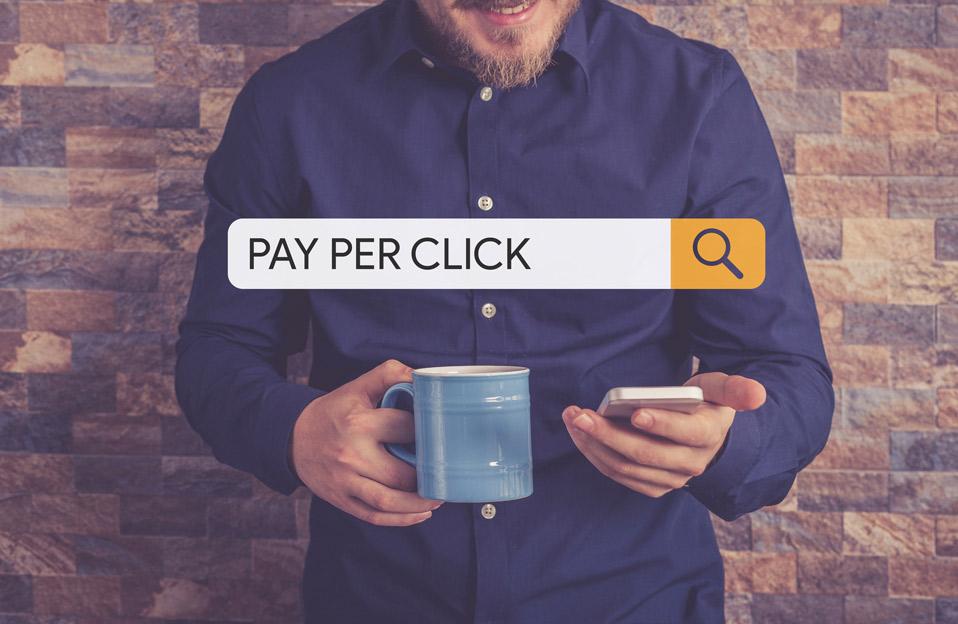One of the great things about SEO is that once you’ve climbed to the top, it doesn’t have to cost you much at all to stay there. The problem is that it can take an awfully long time to get to that point. PPC meanwhile offers you the precise opposite strengths and weaknesses.
PPC stands for ‘Pay Per Click’ and is the main form of advertising online. Pay Per Click essentially means that as an advertiser, you only get charged each time someone actually clicks on one of your adverts.
So, in other words, it doesn’t cost you anything to have your advert published on a website – if no one ever clicks on it, you will never pay a cent! But each time someone does click it, you will be charged X amount of money. This has a lot of handy advantages, as do many of the other features of PPC.
So, let’s dive in and take a closer look…
How PPC Works
So how much exactly do you pay for each click? And where will your ads show? What is the best way to make the most money from it? Essentially, you get to decide precisely how much you want to pay for each click. The caveat is that the less you pay, the less your advert will get seen. That’s because ads are shown based on a ‘bidding system’.
Whenever a space becomes live, all of the relevant ads will be compared and the one that pays the highest will get shown. That means that you can get clicks for .01 cents if you are in a niche with zero competition but for a more competitive industry, you can end up paying as much as $5 per click. The good news is that you only pay the amount you need to beat the next highest competition.
So, if your maximum bid is $5 but there’s only one competitor who is paying $1, then you’ll get the ad for $1.01.
As well as setting how much you’re willing to pay – your maximum bid – you can also set how much you’re willing to pay per week or per month. This is your budget and by setting this, you can ensure that you never spend more cash than you have.
The great thing about this system is that it means you can actually guarantee ROI for your business. You do this by calculating how much it is going to cost you to bring each new visitor to your site – which will be equal to your CPC. You then look at your ‘conversion rate’ (i.e. what percentage of new visitors become paying customers) and then you compare these numbers.
So, if 1 in every 100 visitors buys something from you (a 1% conversion rate) and your product earns you $50 per sale, that means that each visitor is worth $10/100, or 0.5 USD. As long as you are paying less than that per click, you should earn profit from the campaign. That also means that you’ll need a daily budget of a certain amount in order to see daily returns.
Targeting Ads
There’s another great benefit to PPC advertising too and that’s that it allows you to very precisely target specific types of visitors. Targeting means ensuring that only people that you really want to see your ads see them and that can prevent you from wasting money advertising to people who won’t be interested in buying from you.
If you’re selling skateboards to skaters, then you should find your conversion rate goes up significantly versus trying to sell pens to skaters. So how does this work? Well, there are two main PPC programs out there at the moment.
These are: Facebook Ads and Google AdWords (there are others, but these aren’t so big). Google AdWords shows ads on search terms and in that way, it works just like SEO. Your aim here is to make sure that you are paying for your ads to show up on search terms with enough viewers and that are targeted to your precise audience.
You can do this using local search terms again, or you can do it by using search terms that specifically relate to your niche. Facebook Ads meanwhile gives you even more targeting options. With Facebook Ads, your adverts will show on users’ Facebook pages on the right or in their home feeds.
You can then ensure that people only see the ads if they are the right age and sex, if they have the right hobbies and interests, if they have the right income and if they are in the right location. Google AdWords has the advantage of showing ads to people who are currently searching for services and products, whereas Facebook ads can be interruptive.
You can even use Google AdWords as a way to test whether certain keywords are worth pursuing with your SEO. But by closely targeting only people who are likely to be interested in your product, Facebook Ads allow you to avoid wasting money on clicks that would never have bought from you!




